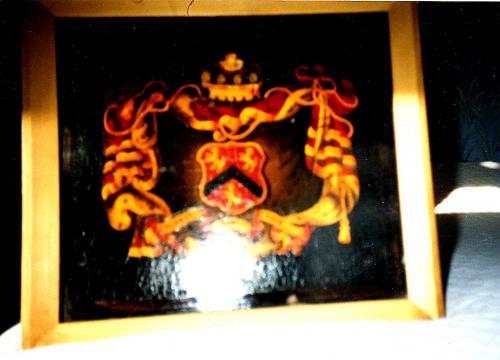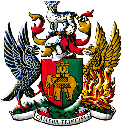dutchman
Spon End
|
1 of 24
Fri 31st Dec 2010 4:04pm
While researching the history of some old buildings in Bolton I came across the following information on a now-defunct website which appears to throw a whole new light on the matter:
Visitors to Bolton are often struck by the number of elephants adorning buildings and street furniture in the town centre and beyond. The true origin of Bolton's curious association with elephants is not known. The Elephant crest appeared on Bolton's unofficial coat of arms from at least 1799.

According to the official description of the Armorial Bearings for the County Borough of Bolton, designed by Major Ottley Perry and registered with the College of Arms in 1890, the Elephant and castle represent Bolton's connection with the old County of Coventry which was founded by the Lancastrian King Henry VI. An Elephant and castle appear on the arms of that City. Bolton's elephant device then also displayed a gold Bishop's Mitre which "was in memory of the long connection of Bolton-le-moors with the ancient Diocese of Mercia (which had its seat in Coventry) and is supposed to have included Bolton.
I suspect therefore that the Elephant & Castle motif has its origins in the ancient Diocese of Mercia rather than the City of Coventry as such? |
|
Local History and Heritage -
Coat of Arms
|
Dougie
Wigan
|
2 of 24
Wed 27th Aug 2014 7:59am
I live about 12 miles from the town of Bolton in Lancashire and go there shopping. While walking round town you often see the Elephant with a castle on its back, it's also on the coat of arms. I would just like to upload this link to the elephants that can be seen in Bolton. Could it have been part of Mercia like Coventry at one time 
A bit of History of Bolton if you're interested   |
|
Local History and Heritage -
Coat of Arms
|
Mike H
London Ontario, Canada
|
3 of 24
Wed 27th Aug 2014 11:08am
Dougie, the Coventry Coat of Arms were granted by Edward III in 1345, essentially the Elephant c/w a castle on its back, red and green shield and the cat on the top. The Elephant with castle represents strength, and the cat represents watchfulness. There is no connection particularly with Mercia which existed between AD 527 and 918, and the elephant/castle appears on others, example 'the Elephant and Castle' in London. I was surprised to find that the two big birds were added as late as 1959, and also that there appears to be no connection between Leofric and a phoenix. The Coventry coat of Arms seems to be a case of 'if the legend is bigger than the story, print the legend'.  |
|
Local History and Heritage -
Coat of Arms
|
pixrobin
Canley
|
4 of 24
Wed 27th Aug 2014 12:03pm
Ain't that always true Mike! "Government of the people, by the people, for the people", comes to my mind  |
|
Local History and Heritage -
Coat of Arms
|
AD
Allesley Park
|
5 of 24
Wed 27th Aug 2014 7:28pm
On 27th Aug 2014 11:08am, Mike H said:
I was surprised to find that the two big birds were added as late as 1959, and also that there appears to be no connection between Leofric and a phoenix.
The Phoenix was always supposed to represent the future of the city and its rebirth from the ashes. The other bird, the Black Eagle, represents its past and is linked with Leofric. |
|
Local History and Heritage -
Coat of Arms
|
Mike H
London Ontario, Canada
|
6 of 24
Thu 28th Aug 2014 12:11am
All I could find was the Mercia shield with a double headed white eagle. |
|
Local History and Heritage -
Coat of Arms
|
Spikeymike
Lowestoft
|
7 of 24
Tue 13th Dec 2016 2:30pm
Hello
I have been trying to find out if a relative of mine was making it up or not. He stated that he was related to Earl of Coventry. His name was James Hampson and he was born C1786 and was married to Hannah Jackson 1804 Trinity church. He lived in Fleet St. Coventry and was an umbrella maker 1814. He was also a bookkeeper at West Orchard and went often to visit relatives in Manchester.
He brandished a gold ring with a coat of arms and had a wood shield that was about 18 inches in size. My auntie managed to get a rather poor photo of the shield that was in the possession of a cousin of mine.
It was Gule a chevron with 3 rampant lions lots of rope twisted around in a knot. A chapeau with 4 pearls or clovers? There is also a tassel hanging on one side. This might be religious? The motto is "Courage sans peur"
The Heralds said it might be an oldie but they have no record of the coat of arms being registered. I did read that King Richard did have 3 lions at one time. It would be great to manage to find it's origin.
Any ideas?
Thanks and kind regards
 |
|
Local History and Heritage -
Coat of Arms
|
Midland Red
|
8 of 24
Tue 13th Dec 2016 2:48pm
Hello and welcome to our friendly forum 
And thanks for your fascinating post  Hope you will enjoy being with us, and that there's some interesting responses to your post |
|
Local History and Heritage -
Coat of Arms
|
Helen F
Warrington
|
9 of 24
Tue 13th Dec 2016 6:44pm
Hi Spikeymike. The closest I can find is a John Fisher on page 717 of the Antiquities of Warwickshire who lived in Great Packington and died in 1570.
Antiquities of Warwickshire
There might be something in the library images but they're down at the moment. |
|
Local History and Heritage -
Coat of Arms
|
Annewiggy
Tamworth
|
10 of 24
Tue 13th Dec 2016 7:36pm
May not be of much help but there may be a little information you don't have.
In a Coventry newspaper February 1843 there is an announcement for the wedding on the 9th inst. at Trinity Church, Mr Charles Ladbrooke of Cubbington plumber to Charlotte, 4th daughter of Mr James Hampson of Manchester. Looking at this on Ancestry this James is your umbrella maker. There is also a report in a Coventry paper of James Hampson of Manchester Iron founder at the Bankrupt Court in 1846.
|
|
Local History and Heritage -
Coat of Arms
|
Helen F
Warrington
|
11 of 24
Tue 13th Dec 2016 9:10pm
More on the Fishers -
Wiki link
The Fisher Baronetcy, of Packington Magna in the County of Warwick, was created in the Baronetage of England on 7 December 1622 for Robert Fisher of Packington Hall, Great Packington, Warwickshire. The second Baronet sat as Member of Parliament for Coventry. The third Baronet died without a male heir and the Packington estates passed to his daughter Mary, wife of the Earl of Aylesford. The fourth Baronet died in 1739, when the baronetcy became dormant. An unsuccessful claim was lodged a few years ago. For more information, follow this link.
Sir Clement Fisher, Coventry MP 1661-1679 |
|
Local History and Heritage -
Coat of Arms
|
Helen F
Warrington
|
12 of 24
Tue 13th Dec 2016 11:05pm
Mary Fisher married Heneage Finch, 2nd Earl of Aylesford and that family crest was similar to your image too.
2nd Earl of Aylesford


|
|
Local History and Heritage -
Coat of Arms
|
Prof
Gloucester
|
13 of 24
Thu 21st Dec 2017 9:18pm
A school friend, who was at Folly Lane School at the time I was, tells me that the wellknown steeplejack, Fred Dibner of Bolton had on his coffin a representation of the Elephant and Castle. The claim was made that at one time Bolton was in the Diocese of Coventry. I think this most unlikely indeed, but can anyone throw light on the claim? If it ever was it had to be a detached part of the Diocese, if that makes sense, and why Bolton in Lancashire linked to Coventry in this way? |
|
Local History and Heritage -
Coat of Arms
|
Annewiggy
Tamworth
|
14 of 24
Thu 21st Dec 2017 10:12pm
Prof, it appears to be something to do with the Diocese of Mercia which had its seat in Coventry. I am afraid I have not been able to get my head round this ancient history but I am sure one if the HC boffins may be able to help. I do know that Tamworth where I live was the ancient capital of Mercia and Tamworth Castle stands in the mound which was the ancient stronghold. |
|
Local History and Heritage -
Coat of Arms
|
Prof
Gloucester
|
15 of 24
Thu 21st Dec 2017 10:23pm
Many thanks Annewiggy and Dutchman. This certainly throws some light on the subject though I doubt that Mercia ever stretched as far as Bolton, as it was the central area of England. |
|
Local History and Heritage -
Coat of Arms
|
 According to the official description of the Armorial Bearings for the County Borough of Bolton, designed by Major Ottley Perry and registered with the College of Arms in 1890, the Elephant and castle represent Bolton's connection with the old County of Coventry which was founded by the Lancastrian King Henry VI. An Elephant and castle appear on the arms of that City. Bolton's elephant device then also displayed a gold Bishop's Mitre which "was in memory of the long connection of Bolton-le-moors with the ancient Diocese of Mercia (which had its seat in Coventry) and is supposed to have included Bolton.
According to the official description of the Armorial Bearings for the County Borough of Bolton, designed by Major Ottley Perry and registered with the College of Arms in 1890, the Elephant and castle represent Bolton's connection with the old County of Coventry which was founded by the Lancastrian King Henry VI. An Elephant and castle appear on the arms of that City. Bolton's elephant device then also displayed a gold Bishop's Mitre which "was in memory of the long connection of Bolton-le-moors with the ancient Diocese of Mercia (which had its seat in Coventry) and is supposed to have included Bolton. According to the official description of the Armorial Bearings for the County Borough of Bolton, designed by Major Ottley Perry and registered with the College of Arms in 1890, the Elephant and castle represent Bolton's connection with the old County of Coventry which was founded by the Lancastrian King Henry VI. An Elephant and castle appear on the arms of that City. Bolton's elephant device then also displayed a gold Bishop's Mitre which "was in memory of the long connection of Bolton-le-moors with the ancient Diocese of Mercia (which had its seat in Coventry) and is supposed to have included Bolton.
According to the official description of the Armorial Bearings for the County Borough of Bolton, designed by Major Ottley Perry and registered with the College of Arms in 1890, the Elephant and castle represent Bolton's connection with the old County of Coventry which was founded by the Lancastrian King Henry VI. An Elephant and castle appear on the arms of that City. Bolton's elephant device then also displayed a gold Bishop's Mitre which "was in memory of the long connection of Bolton-le-moors with the ancient Diocese of Mercia (which had its seat in Coventry) and is supposed to have included Bolton.


![Next page [or press the "Right arrow" key] Next page](../resource/colour_tint_inc.php?img_file=right-arrow.png&clr=AA5511)




